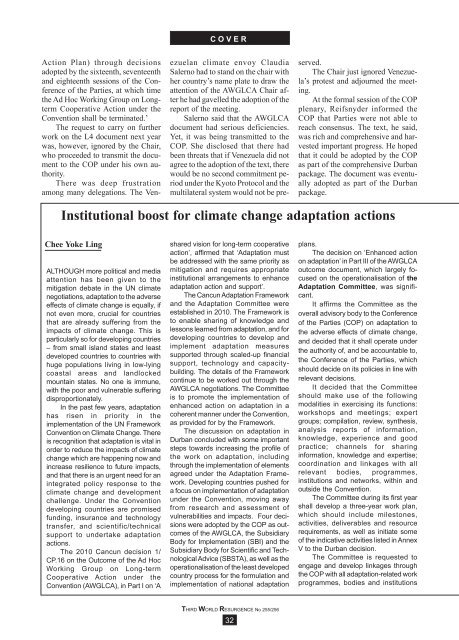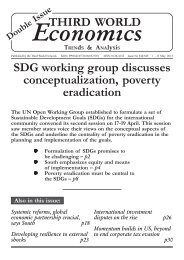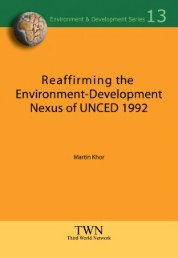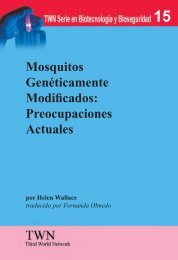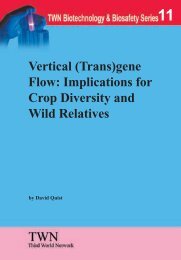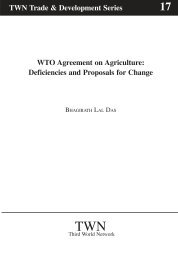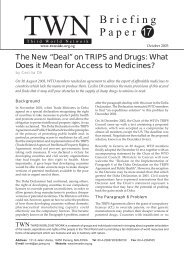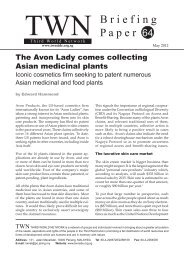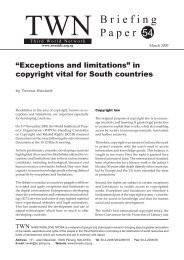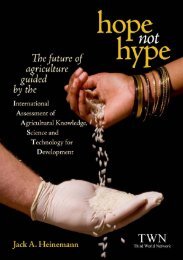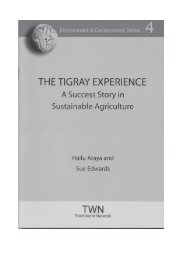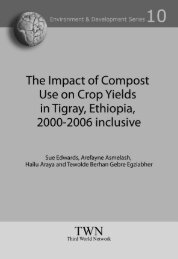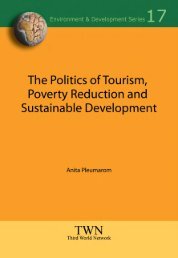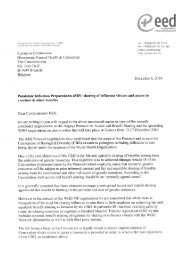Download - Third World Network
Download - Third World Network
Download - Third World Network
Create successful ePaper yourself
Turn your PDF publications into a flip-book with our unique Google optimized e-Paper software.
C O V E R<br />
Action Plan) through decisions<br />
adopted by the sixteenth, seventeenth<br />
and eighteenth sessions of the Conference<br />
of the Parties, at which time<br />
the Ad Hoc Working Group on Longterm<br />
Cooperative Action under the<br />
Convention shall be terminated.’<br />
The request to carry on further<br />
work on the L4 document next year<br />
was, however, ignored by the Chair,<br />
who proceeded to transmit the document<br />
to the COP under his own authority.<br />
There was deep frustration<br />
among many delegations. The Venezuelan<br />
climate envoy Claudia<br />
Salerno had to stand on the chair with<br />
her country’s name plate to draw the<br />
attention of the AWGLCA Chair after<br />
he had gavelled the adoption of the<br />
report of the meeting.<br />
Salerno said that the AWGLCA<br />
document had serious deficiencies.<br />
Yet, it was being transmitted to the<br />
COP. She disclosed that there had<br />
been threats that if Venezuela did not<br />
agree to the adoption of the text, there<br />
would be no second commitment period<br />
under the Kyoto Protocol and the<br />
multilateral system would not be preserved.<br />
The Chair just ignored Venezuela’s<br />
protest and adjourned the meeting.<br />
At the formal session of the COP<br />
plenary, Reifsnyder informed the<br />
COP that Parties were not able to<br />
reach consensus. The text, he said,<br />
was rich and comprehensive and harvested<br />
important progress. He hoped<br />
that it could be adopted by the COP<br />
as part of the comprehensive Durban<br />
package. The document was eventually<br />
adopted as part of the Durban<br />
package.<br />
Institutional boost for climate change adaptation actions<br />
Chee Yoke Ling<br />
ALTHOUGH more political and media<br />
attention has been given to the<br />
mitigation debate in the UN climate<br />
negotiations, adaptation to the adverse<br />
effects of climate change is equally, if<br />
not even more, crucial for countries<br />
that are already suffering from the<br />
impacts of climate change. This is<br />
particularly so for developing countries<br />
– from small island states and least<br />
developed countries to countries with<br />
huge populations living in low-lying<br />
coastal areas and landlocked<br />
mountain states. No one is immune,<br />
with the poor and vulnerable suffering<br />
disproportionately.<br />
In the past few years, adaptation<br />
has risen in priority in the<br />
implementation of the UN Framework<br />
Convention on Climate Change. There<br />
is recognition that adaptation is vital in<br />
order to reduce the impacts of climate<br />
change which are happening now and<br />
increase resilience to future impacts,<br />
and that there is an urgent need for an<br />
integrated policy response to the<br />
climate change and development<br />
challenge. Under the Convention<br />
developing countries are promised<br />
funding, insurance and technology<br />
transfer, and scientific/technical<br />
support to undertake adaptation<br />
actions.<br />
The 2010 Cancun decision 1/<br />
CP.16 on the Outcome of the Ad Hoc<br />
Working Group on Long-term<br />
Cooperative Action under the<br />
Convention (AWGLCA), in Part I on ‘A<br />
shared vision for long-term cooperative<br />
action’, affirmed that ‘Adaptation must<br />
be addressed with the same priority as<br />
mitigation and requires appropriate<br />
institutional arrangements to enhance<br />
adaptation action and support’.<br />
The Cancun Adaptation Framework<br />
and the Adaptation Committee were<br />
established in 2010. The Framework is<br />
to enable sharing of knowledge and<br />
lessons learned from adaptation, and for<br />
developing countries to develop and<br />
implement adaptation measures<br />
supported through scaled-up financial<br />
support, technology and capacitybuilding.<br />
The details of the Framework<br />
continue to be worked out through the<br />
AWGLCA negotiations. The Committee<br />
is to promote the implementation of<br />
enhanced action on adaptation in a<br />
coherent manner under the Convention,<br />
as provided for by the Framework.<br />
The discussion on adaptation in<br />
Durban concluded with some important<br />
steps towards increasing the profile of<br />
the work on adaptation, including<br />
through the implementation of elements<br />
agreed under the Adaptation Framework.<br />
Developing countries pushed for<br />
a focus on implementation of adaptation<br />
under the Convention, moving away<br />
from research and assessment of<br />
vulnerabilities and impacts. Four decisions<br />
were adopted by the COP as outcomes<br />
of the AWGLCA, the Subsidiary<br />
Body for Implementation (SBI) and the<br />
Subsidiary Body for Scientific and Technological<br />
Advice (SBSTA), as well as the<br />
operationalisation of the least developed<br />
country process for the formulation and<br />
implementation of national adaptation<br />
plans.<br />
The decision on ‘Enhanced action<br />
on adaptation’ in Part III of the AWGLCA<br />
outcome document, which largely focused<br />
on the operationalisation of the<br />
Adaptation Committee, was significant.<br />
It affirms the Committee as the<br />
overall advisory body to the Conference<br />
of the Parties (COP) on adaptation to<br />
the adverse effects of climate change,<br />
and decided that it shall operate under<br />
the authority of, and be accountable to,<br />
the Conference of the Parties, which<br />
should decide on its policies in line with<br />
relevant decisions.<br />
It decided that the Committee<br />
should make use of the following<br />
modalities in exercising its functions:<br />
workshops and meetings; expert<br />
groups; compilation, review, synthesis,<br />
analysis reports of information,<br />
knowledge, experience and good<br />
practice; channels for sharing<br />
information, knowledge and expertise;<br />
coordination and linkages with all<br />
relevant bodies, programmes,<br />
institutions and networks, within and<br />
outside the Convention.<br />
The Committee during its first year<br />
shall develop a three-year work plan,<br />
which should include milestones,<br />
activities, deliverables and resource<br />
requirements, as well as initiate some<br />
of the indicative activities listed in Annex<br />
V to the Durban decision.<br />
The Committee is requested to<br />
engage and develop linkages through<br />
the COP with all adaptation-related work<br />
programmes, bodies and institutions<br />
THIRD WORLD RESURGENCE No 255/256<br />
32


